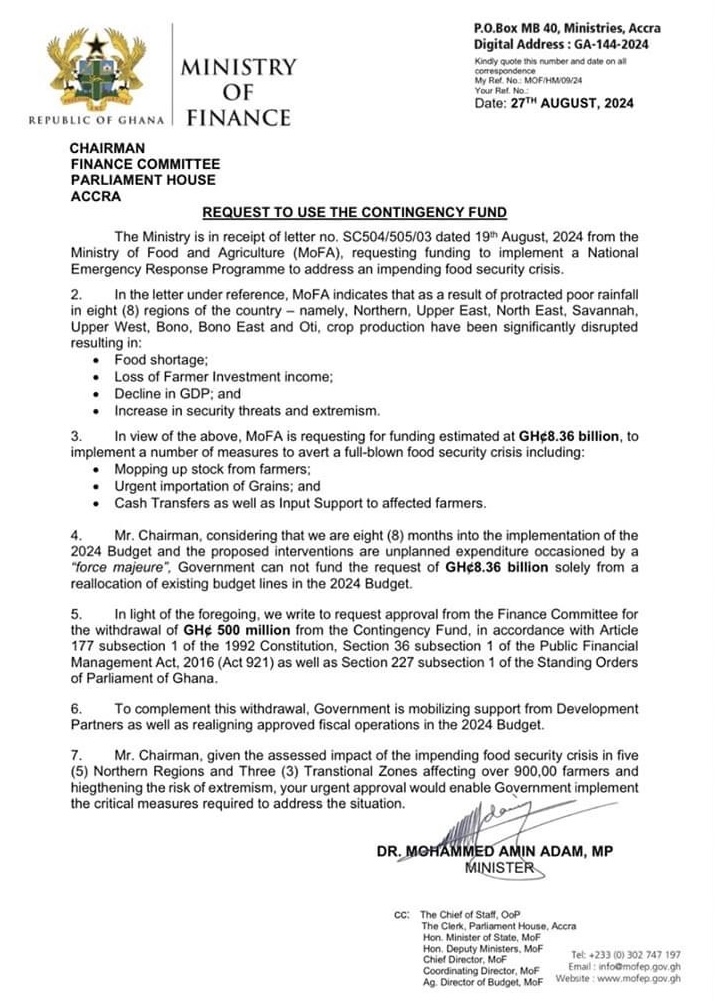Leaked Finance Minister letter asking for GH¢8.36b confirms imminent full blown food crisis in Ghana

There is no publicly known official acknowledgement of a food crisis in Ghana, even though food prices have been fluctuating and in many cases prices have shot up, a leaked letter signed by the Minister of Finance Dr Mohammed Amin Adam to Parliament’s Finance Committee seeking an amount of GH¢8.36 billion in following a request by the Ministry of Food and Agriculture (MoFA) becomes a grim confirmation that Ghana has been going through a food crisis and if nothing is done, it would get worse.
While the government hasn’t said anything clearly about a food crisis, the MoFA this week announced a ban on the export of some grains from the country.
According to news reports, the Ghana government has placed a temporarily ban on export of grains with immediate effect to ensure availability of food produce on the domestic market.
The decision is necessitated by threats of shortage of maize, rice, millet and sorghum from eight regions due to erratic rainfall pattern from June to August, this year.
The letter from the Ministry is also requesting for approval from the Finance Committee of Parliament to withdraw some GH¢500 million from the contingency fund to avert an imminent full blown food crisis.
Speaking to Ghana Business News, Bismark Owusu Nortey, Acting Executive Director, Peasant Farmers Association of Ghana, said Ghana hasn’t experienced a drastic condition of food shortage, but if one looks at the factors of food security such as affordability, availability accessibility, and quality of food, in the country, it is obvious that there is a food security issue.
“The questions are, over the past few years, has the food been available? Most food here are imported, and that means the food is not available. With inflation around 20 per cent, and driven by food inflation, that makes food not affordable,” Mr Nortey said, adding that there is an issue with accessibility.
He further indicated that while the country is not in a situation of serious shortage, one can’t get the quantity of food one needs on the market and “the indicators show that we have a crisis”, he said.
The letter from the Ministry is also requesting for approval from the Finance Committee of Parliament to withdraw some GH¢500 million from the contingency fund to avert an imminent full blown food crisis.
“If anything, parts of the money should be allocated for capital investments like irrigation facilities and not only the provision of fertilizer, seeds, and cash hand outs,” he said.
Ghana Business News has confirmed the authenticity of the letter doing the rounds on social media from multiple sources. It has been established that the letter is from the Ministry of Finance and has all the characteristics of a request to withdraw money from the Contingency Fund.
The letter dated August 27, 2024 makes reference to a MoFA letter dated August 19, 2024, in which the Ministry is requesting for the release of the funds “to implement a National Emergency Response Programme to address an impending food security crisis.”
The MoFA letter referred to, states that due to protracted poor rainfall in eight regions of the country there will be food shortage, loss of farmer investment income, decline in GDP, and increase in security threats and extremism. The letter lists the eight regions of the country’s 16 as follows: Northern, Upper East, North East, Savannah, Upper West, Bono, Bono East and Oti.

The Ministry of Finance letter is saying that in light of the foregoing, it was asking for approval from the Finance Committee to withdraw GH¢500 million from the Contingency Fund, in accordance with Article 177 subsection 1 of the 1992 Constitution, Section 36 subsection 1 of the Public Financial Management Act, 2016 (Act 921) as well as Section 227 subsection 1 of the Standing Orders of Parliament of Ghana.
The government had been running a programme to ensure food security known as Planting for Food and Jobs (PFJ). And it set an implementation plan for the PFJ from 2017 to 2020 with the aim of increasing the number of smallholder beneficiary farmers from 200,000 in 2017 to 1.6 million by 2020.
The programme had a planned budget of GH¢3.3 billion over four years. Available budget estimates however, suggest that the government spent only GH¢2.3 billion (valued in 2017 prices) on the programme over four years, or 31 percent below budget, and this figure includes GH¢204.8 million in 2017, which was reportedly spent technically on fertilizer for the programme.
Meanwhile, the entire budget allocation for the MoFA was GH¢501 million in 2016.
According to some official reports on the PFJ, the number of farmers receiving subsidized inputs consistently exceeded targets. The reports say by 2020, 1.74 million farmers out of an estimated 2.6 million agricultural households participated in the programme. The PFJ also set job creation targets ranging from 863,500 in 2017 to 1,492,000 in 2020. While some of the reports suggest that these targets were achieved in the first year of the PFJ, no official statistics were ever published to verify this.
“Looking at past experiences, this blanket request is likely to go into private pockets, more than benefit the public”, he said.
But according to Mr Nortey, over GH¢4 billion was spent on the PFJ.
He also said; “We have spent more than $12 million on dams and irrigation (Including One Village One Dam), and two months after, the country is suffering a dry spell. We can’t get the gains,” he said.
Explaining further, Mr Nortey said, the ideas behind the dams that were constructed were to provide water for communities in the north of the country to be able to farm all year round. So that farmers can harvest water from the dams to farm during the dry spell. But the dams dried out when there was drought. He also said the reasons were that the dams were poorly constructed, and some were situated at the wrong places, making it impossible for the farmers to access and use them when they needed them.
To convince that Committee, the Minister of Finance wrote among other things that “considering that we are eight months into the implementation of the 2024 Budget and the proposed interventions are unplanned expenditure occasioned by a Force Majeure, government can not fund the request of GH¢8.36 billion solely from a reallocation of existing budget lines in the 2024 Budget.
To complement this withdrawal, government is mobilizing support from Development Partners as well as realigning approved fiscal operations in the 2024 Budget.
Mr. Chairman, given the assessed impact of the impending food security crisis in five Northem Regions and Three Transtional Zones affecting over 900,00 farmers and heightening the risk of extremism, your urgent approval would enable government implement the critical measures required to address the situation,” the Minister wrote.
Asked about the letters, Mr Nortey said, the letter from the Ministry of Finance following the request from the Ministry of Food and Agriculture is in response to the dry season.
“While concerned about the dry spell, we are concerned that farmers have lost their investments.
He also expressed concern about the clarity of the request for the funds.
He is of the view that the request is grounded in opacity and there is no due diligence, and added that it would create a situation for people to fleece the state. “Looking at past experiences, this blanket request is likely to go into private pockets, more than benefit the public”, he said.
“If anything, parts of the money should be allocated for capital investments like irrigation facilities and not only the provision of fertilizer, seeds, and cash hand outs,” he said.
By Emmanuel K Dogbevi
Copyright ©2024 by NewsBridge Africa
All rights reserved. This article or any portion thereof may not be reproduced or used in any manner whatsoever without the express written permission of the publisher except for the use of brief quotations in reviews.
